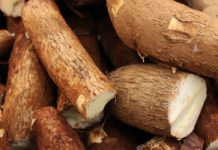Are there Foods that Cure Dry Skin?
Many of us don`t like to have dry skin. The discomfort and not-so-great look it gives are quite unpleasant. The skin may be dry for some reasons such as genetics, lifestyle, and age. What you eat can also affect your skin type. There are certain kinds of food which will help build healthier skin. Let’s consider a variety of food that will work against dry skin and make it moist and softer.
11 Foods that Combat Dry Skin
Water
Water is the most important and beneficial source of hydration for humans. If you want to get rid of dry skin, you need to stay hydrated at all times. Water rehydrates your cells and keeps them active and functioning. Water also helps your body to maintain homeostasis. To treat your dry skin with water, drink at least eight glasses of water daily.
Bananas
Bananas are an effective skin cleanser. They contain vitamins A, B, C, and D, niacin, magnesium, calcium, phosphorus, riboflavin, copper, zinc, iron, pantothenic acid, dietary fiber, and potassium. Bananas have anti-wrinkle properties and are excellent at moisturizing and cleansing the skin. Bananas` dietary fiber content is an enemy to toxins.
You may consume two bananas a day by snacking on it or making banana smoothies, pancakes, cakes and cereal with it.
You may also make a banana face pack made of half a mashed banana, a teaspoon of honey and a tablespoon of yogurt. Rinse it off with lukewarm water twenty minutes after application.
Nuts
 Eating different types of nuts such as almonds, walnuts, macadamia, pistachios, cashew nuts, pine nuts, hazelnuts, and groundnuts enrich the body with essential fatty acids (EFAs) like omega-3 and omega-6, proteins, vitamin E and B-group vitamins, magnesium, zinc, calcium, potassium, selenium, copper, iron, and dietary fiber. Nuts improve circulation, maintain cell turgidity, and keep fluids in the cells, hence retaining the supple and glowing quality of your skin.
Eating different types of nuts such as almonds, walnuts, macadamia, pistachios, cashew nuts, pine nuts, hazelnuts, and groundnuts enrich the body with essential fatty acids (EFAs) like omega-3 and omega-6, proteins, vitamin E and B-group vitamins, magnesium, zinc, calcium, potassium, selenium, copper, iron, and dietary fiber. Nuts improve circulation, maintain cell turgidity, and keep fluids in the cells, hence retaining the supple and glowing quality of your skin.
To treat your skin with nuts, you may soak some nuts overnight, then eat them the following morning with your breakfast.
To use almonds as a face mask, soak six almonds overnight, peel the skin of the almonds, and use a blender to make some paste of the almond. Add two tablespoons of milk to the mix and stir properly. Apply this mask on your face and leave for about 20 minutes before wiping it with a clean and soft towel dipped in lukewarm water.
Aloe Vera
This popular skincare plant is bursting with lipids, water, vitamins A, C, E, B12, zinc, copper, potassium, chromium, calcium, amino acids, magnesium, selenium, and some other healthy components. The antioxidant, antibacterial, and anti-inflammatory properties of the aloe vera plant rehydrate, moisturize, and soften the skin. They aid collagen synthesis and protect the skin from UV radiation and aging.
You may apply the aloe vera gel and leave it on your skin for 20 minutes before bathing in lukewarm water.
Coconut Oil
For many centuries, coconut oil has sustained its popularity in treating many hair and skin conditions. Coconut oil contains proteins, vitamins E and K, monounsaturated fats, and polyunsaturated fats. This oil also possesses antibacterial and anti-inflammatory properties. It moisturizes the skin and provides it with enough fat, which is an integral part of cells.
Organic coconut oil enriches your skin when you apply it overnight. To wipe it off, you may take a warm shower and use a mild soap.
Fish
Many cold-water fishes such as cod, salmon, tuna, and herring have significant health benefits. They reduce inflammation, flush out toxins, and give moisture to the skin, causing the skin to glow and avoiding unnecessary dryness.
Eat your fish with the skin, as the fatty layer below it is loaded with omega-3 fatty acids, preventing dryness of the skin.
You may also take fish oil capsules, based on a recommended dosage from your physician.
Avocados
You may be familiar with the avocado, but you are probably not familiar with its nutritional value. A cup of pureed avocado contains about 23mg of vitamin C, 4.8mg of vitamin E, 253 mg omega-3 fatty acids, and 183mcg of folate. These nutrients repair skin tissues, rehydrate the skin cells, and reduce wrinkles.
You could use avocados in making dishes like the avocado sauce, salad, avocado smoothie, and guacamole.
You may also apply avocado on the skin by preparing a mask using mashed avocado, some yogurt, and some honey. You may leave this mask on for about 20 minutes before being wiping it off with some lukewarm water.
Olive Oil
 The olive oil is one of the essential and multipurpose oils that people have used for centuries. The fatty acids in olive oil maintain the quality of the outer layer of the skin and aid the healing of wounds. Its anti-inflammatory and antioxidant properties protect the skin from photodamage and scar formation. This non-sticky olive oil can help to maintain a hydrated skin while keeping your skin soft after a short period.
The olive oil is one of the essential and multipurpose oils that people have used for centuries. The fatty acids in olive oil maintain the quality of the outer layer of the skin and aid the healing of wounds. Its anti-inflammatory and antioxidant properties protect the skin from photodamage and scar formation. This non-sticky olive oil can help to maintain a hydrated skin while keeping your skin soft after a short period.
You may adopt the extra virgin olive oil as your cooking oil for salad dressing and fried meat.
You could also apply the oil on your skin. For the topical application, mix two tablespoons of olive oil, two tablespoons of milk, and a tablespoon of honey, then apply the mixture on your skin. Leave it on for 30 minutes then wash it off with lukewarm water.
Flaxseeds
Flaxseeds treat various health conditions, including dry skin. Flaxseeds contain a truckload of essential omega-3 and omega-6 fatty acids, lignans, phytoestrogen, proteins, and dietary fiber. Flaxseeds possess antioxidant and anti-inflammatory properties, hence they eliminate toxins and reduce skin irritation. The tiny flaxseeds improve the circulation of fluid.
Try adding ground or milled flaxseed powder to your breakfast or dinner. You may also add it to your snacks and desserts such as smoothies, juices, salads, and cereal.
You could make a face mask of flaxseed by adding a teaspoon of yogurt to a tablespoon of flaxseed powder and mix it properly. Apply this mask on your skin and leave it on for about 20 minutes. Rinse it off with lukewarm water afterward.
Chamomile Tea
This tea is a herbal tisane made from chamomile blossoms. It contains vitamin A, folate, and minerals such as calcium, potassium, sodium, magnesium, and iron. Its numerous anti-inflammatory compounds, such as alpha-bisabolol and chamazulene, can help soothe your dry and itchy skin. It also has antioxidant properties that help reduce the toxic load from the body, thereby allowing the cells to function correctly. The chamomile tea also helps in hydrating your skin, however, it isn’t a substitute for water.
You may sip on a cup of chamomile tea to reverse your dry skin condition or rub the tea bags on your skin. You may also have a chamomile tea bath — add some chamomile tea, honey, and coconut oil to your bathwater to do this.
Cucumbers
Cucumbers are super healthy and are excellent at treating dry skin. An average piece of cucumber contains about 287g of water, vitamins A, C, and K, folate, calcium, zinc, selenium, phosphorus, magnesium, potassium, omega-3 fatty acids, and dietary fiber. Its high water content makes it one of the best foods for combatting dry skin.
To treat dry skin with cucumbers, cut a few thin slices of cucumbers, sprinkle some salt on them, and eat. If you can, it is better to eat them without salt. You may also add some cucumbers to your salads, sandwich, juice or water.
To make a face mask, peel the cucumber and grate it finely. You may add a teaspoon of honey and aloe vera gel each before mixing. Apply this mask and leave it on for about 20 minutes. You could wipe the mask off with a towel dipped in lukewarm water.




